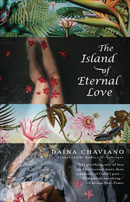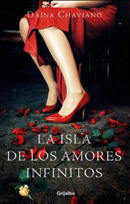
The Island of Eternal Love is four intriguing stories in one. The framing story concerns Cecilia, a woman searching for answers to the appearances of a phantom house in Miami. She is a journalist living in exile from her mother country Cuba, for which she has ambivalent feelings.
In her loneliness, Cecilia visits a bar where the bolero stars of a past Havana are celebrated, as they are throughout the novel. Cecilia strikes up a friendship with an older woman, Amalia, who tells her three historical stories that mingle family saga with mythology and fantasy.
The stories begin in China with Kui-fa, who worships the Moon goddess of compassion. Kui-fa, or Rosa as she becomes, must leave China with her husband and son Pag Li soon after war destroys their home and family. On arriving in Cuba, Pag Li changes his name to Pedro.
The second story concerns the mulatto Caridad, whose mother was stolen from Africa, enslaved, and raped on the ship to Cuba. Caridad's parents, once freed, set up a thriving import business. Disaster strikes and Caridad and her mother must seek refuge in a brothel. The madam calls on Oshun, an African goddess, to help Caridad's mother in her new work, but Caridad's future is also affected by the shamelessly sexual spirit.
The final tale told by Amalia is about Angela, a Spanish girl afflicted by a duende, a mischievous spirit that appears only to the women of her family. Angela's family must move to the country because of the duende's mischief. While there, Angela meets a water sprite, and also the god Pan—who gives her a wish and promises to protect her future family. The story ends with Angela and her new husband emigrating to Cuba, and becoming involved in the music industry.
Predestiny, the occult, and magical fantasy are the cornerstones of this historical romance—a wonderful combination that surrounds and uplifts the political and personal tragedies of the characters and of Cuba's recent history. Women are the storytellers and the wellspring and conduit for magical healing and knowledge.
How all of the stories come together at the end for Amalia and Cecilia is very satisfying. As a result of their encounter, Cecilia begins to reconcile the Havana she has left and to embrace the Miami where she now resides; yet there is also a feeling that Cecilia or her family will travel further journeys before Havana's entrepreneurial spirit thrives again.
The Island of Eternal Love, this complex, magical novel, is the first book I have read—but not
the last—by Daina Chaviano, a fabulous Latin American author.


Riverhead, paperback, 9781594483790
Grijalbo, paperback, 9780307376541
